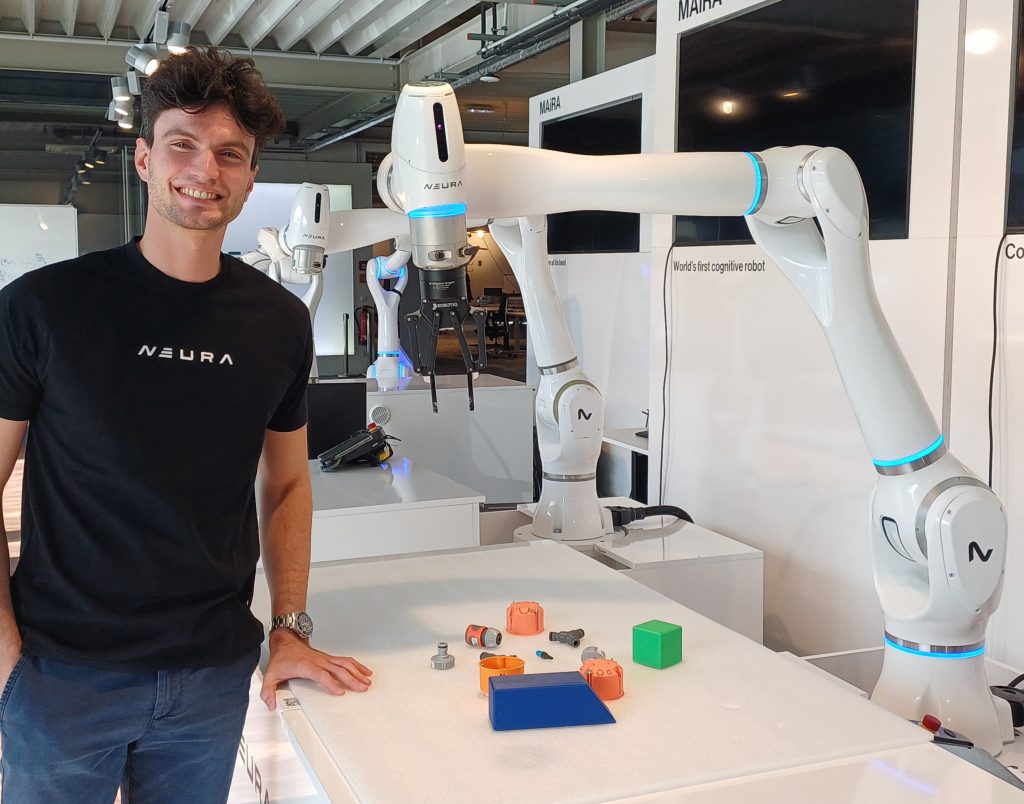Francesco Fornasaro – RWTH Aachen University
What differences did you notice between the educational system of the host university and that of your home institution, particularly regarding technical courses such as control, automation, or robotics?
At RWTH Aachen, in the robotics and mechatronics courses, I found a significant difference in the way topics are presented during lectures and in the approach to exams. At Politecnico di Milano, theory is always central, and every topic addressed is usually accompanied by at least a formal justification, if not a complete proof. At RWTH Aachen, on the other hand, in most cases, these are not presented during lectures, which focus more on industrial standards and conventions established in engineering practice through experience, favoring a more pragmatic approach. Consequently, exams are different: the emphasis is on the rapid and intuitive application of more factual knowledge. I find that this approach, although new to me, has been beneficial, as it complements the more rigorous training I received in Italy. My mastery of various topics has certainly been enriched, providing me with a distinctly operational perspective. The Advanced Software Engineering course followed the same logic, focusing almost exclusively on practical exercises and implementation activities.
How did the mobility experience contribute to expanding your technical and/or practical skills in the field of automation and control? Did you have access to laboratories, projects, or particularly relevant technologies?
During the Robotic Systems and Applied Numerical Optimization courses, I had the opportunity to deepen my knowledge of ROS2 and the SciPy optimization library, respectively. In particular, in Applied Numerical Optimization, every lesson was accompanied by a lab session and often by an assignment. From this point of view, however, I did not notice major differences compared to Politecnico, where, during the master’s degree, well-structured laboratory hours have always been present. There were also frequent seminars held by companies and research centers: valuable opportunities to understand the contemporary robotics landscape, discover related professional opportunities, and establish professional relationships.
Did you have the opportunity to work on international projects, in multicultural teams, or with professors/researchers of other nationalities? If so, what did you learn from these interactions, including in terms of soft skills?
At RWTH Aachen, I had the opportunity to interact with professors and, above all, students from different countries. The group projects I completed with the latter gave me the chance to confront different approaches and habits, typical of other cultures, regarding deadlines, task division, and communication with professors.
However, the most important part of my international and multicultural experience was certainly coming into contact with Neura Robotics, a robotics company based in Baden-Württemberg, Germany. After meeting some of their engineers during one of the seminars organized during the semester, I had the opportunity to undergo the selection interviews and start a working experience in the Software Control team of the company’s R&D department, where I still work alongside engineers of various nationalities. In this context, I am contributing to the design of new components of the software architecture and becoming familiar with the tools and workflows typical of the industrial environment. At the same time, I am learning not only what it means to collaborate in a team on large-scale projects, but also how to give and receive feedback and how to manage interpersonal dynamics in an international technical context.
From a personal perspective, what were the main challenges you faced during your time abroad and how do you think they affected your academic and personal growth?
A special mention must go to the bureaucracy and the related deadlines, whose management before departure, combined with insurance issues and the search for accommodation in Aachen, was quite a headache. My advice to anyone considering mobility in Aachen is to start the house search at least two or three months before departure. The same goes for health insurance: it is essential to act well in advance.
During the mobility period itself, the biggest challenge was undoubtedly balancing study with an extremely stimulating social environment. Although Aachen is not a metropolis, it is a lively city full of activities. The university itself organizes many events to promote integration: welcome week, parties, barbecues, and social gatherings that are held regularly throughout the semester. Finding a balance between study and social life is not easy, but it is possible. Clearly, the “Fear of Missing Out” is always around the corner, but learning to manage it is part of personal growth.
From an academic point of view, I had to adapt to a different management of exam sessions: all the exams I took in Aachen had only one sitting per session, and being able to prepare for each, while coordinating my studies with the preparation for interviews with Neura Robotics, was a new experience for me, as I was used to always having at least two sittings available.
Would you recommend this experience to other students of Automation and Control Engineering? What aspects do you consider most relevant before undertaking an international mobility program?
I strongly recommend this experience to other students of Automation and Control Engineering. Doing a mobility experience during the master’s degree can be extremely beneficial: you approach it with greater maturity and can use it strategically according to your professional goals. Of course, there are plenty of opportunities to have fun, travel, meet people, and learn a new language, but what I consider truly important is the set of opportunities that open up when you start from scratch at a new university, where you are often treated as an honored guest.
In my case, the aspects I considered most carefully before leaving for Aachen were the background of the host country and university in my area of interest, robotics, and the spoken language, German, which I had wanted to learn for some time. Although I have not yet mastered the formidable German grammar, I have made more than a few steps forward, while the academic environment in robotics proved to be as thriving as expected.
